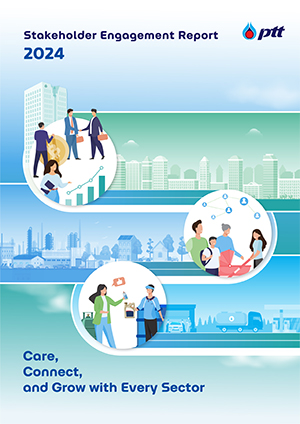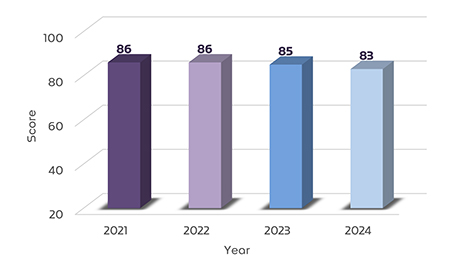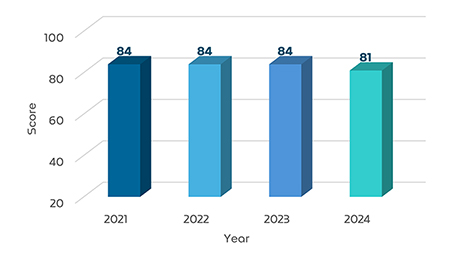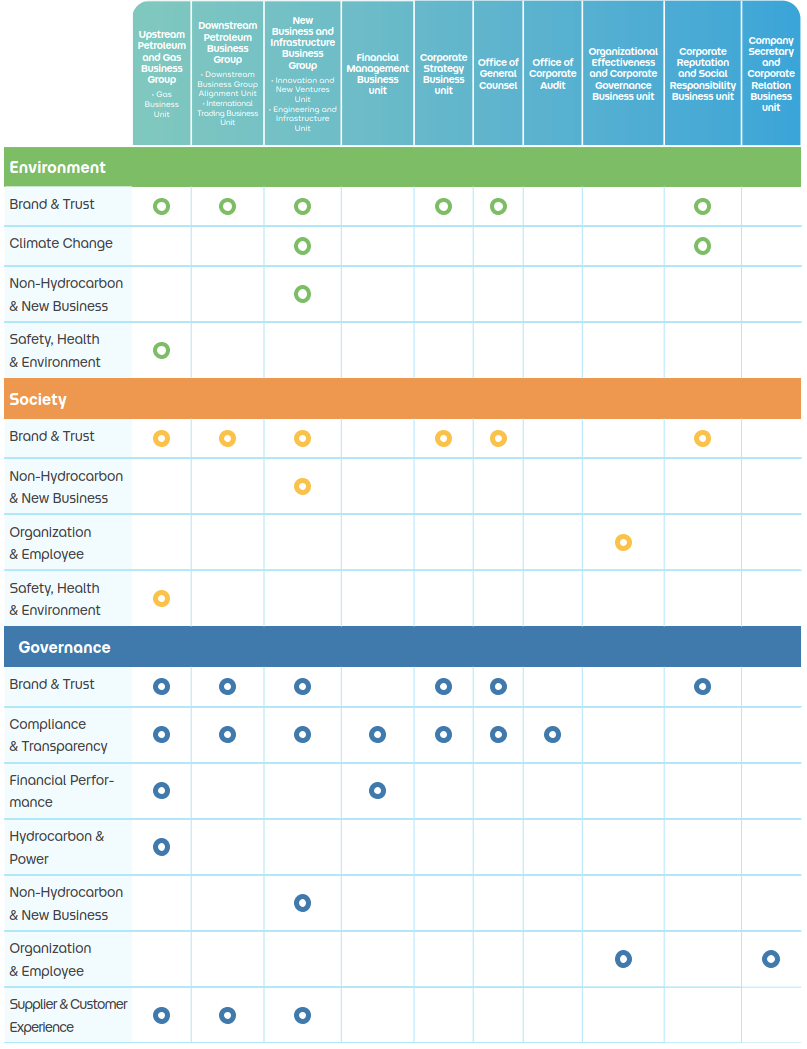| Sustainable Development Goals |
Stakeholder Engagement Report

Stakeholder Engagement Report 2024
Policy and Strategic Direction for Stakeholder Engagement GRI 2-29
The success of PTT is built upon the collaboration and engagement of all key stakeholders. The company is dedicated to fostering balanced relationships with every stakeholder group, including Public Sector, Society and Community, Investors, Customers, Suppliers and Partners, Board of Directors and Employees. This commitment is essential to driving cooperation, overcoming challenges, and achieving sustainable growth together. PTT established Stakeholder Engagement Policy, signed by the President and Chief Executive Officer on February 1, 2022. The key points can be summarized as follows:
- Emphasize the participation of all stakeholder groups in PTT’s activities, taking into account the cultural values, traditions, beliefs, and differences of stakeholders.
- Create transparency and disclose information about PTT’s activities and their potential impact on stakeholders.
- Respond to the needs and expectations of stakeholders on issues that are material to both stakeholders and PTT, which will impact sustainable operations.
- Apply the concept of stakeholder engagement to governance, decision-making, strategy development, and the operations of the PTT Group.
- Operate in compliance with internationally recognized standards for stakeholder engagement and publicly disclose the results of stakeholder engagement.
To translate its policy into tangible results and adapt to the evolving business environment, PTT has reviewed its stakeholder management strategy and set the 2025 Stakeholder Management Vision: “To be an organization that is a source of pride for the Thai people, upholding balanced engagement with all stakeholders towards growth that contributes to a sustainable world.” The Company’s strategic direction for stakeholder management is captured by the mantra “Understanding, Engaging, Networking”. “Understanding” is enhancing the efficiency and effectiveness of communication with stakeholders. “Engaging” develops engagement processes and drive execution by taking stakeholders into account in all operations throughout the supply chain. “Networking” strengthens and cultivates a resilient stakeholder network. This strategy encompasses all six stakeholder groups that are involved in or relevant to PTT’s current and/or planned business activities within PTT Group’s operational sites and surrounding areas, including activities in Thailand and oversea whether directly managed by PTT or otherwise, as well as joint venture projects. The ultimate objective is to be recognized and supported by all stakeholders (License to Operate).

PTT is committed to fostering strong and constructive relationships with all stakeholder groups, in alignment with its strategic direction. The Company aims to build stakeholder trust in its operations while advancing sustainable business growth.
Stakeholder Engagement Process
PTT provides opportunities for stakeholders to express their opinions and participate in shaping key issues of the Company’s operations. The Company is committed to addressing stakeholder needs, expectations, and concerns in a manner that is timely, appropriate, and responsive. PTT’s stakeholder management practices are based on international standards, particularly the AA1000 Stakeholder Engagement Standard 2015 (AA1000SES), and follow the criteria of Stakeholder and Customer Management (SCM) outlined in the State Enterprise Assessment Model (SE-AM) and Core Business Enablers Management of state enterprise, and the Global Reporting Initiative (GRI) Standards, which collectively provide a comprehensive framework for stakeholder engagement. These standards ensure a structured and effective approach to stakeholder engagement that supports the Company’s long-term sustainable growth while strengthening stakeholder trust. The roles, duties and responsibilities of PTT stakeholder management are structured as follows:
- Corporate Level (Stakeholder Management Department), who is the corporate stakeholder management policy and strategic direction maker, as well as overseeing the overall relationship-building process across the organization.
- Business Unit Level, who is deploys the corporate stakeholder management policy and strategy to responsible persons at the department level to proceed with the relevant parts and consolidate the stakeholder relationship plan at the business unit level.
- Department Level, who is responsible for developing stakeholder engagement plans and setting performance indicators, including Leading Key Stakeholder Indicators (Leading KSIs) and Lagging Key Stakeholder Indicators (Lagging KSIs). These units are also tasked with executing, monitoring, and evaluating stakeholder engagement activities relevant to their operations.
Performance monitoring and reporting are conducted at both the corporate and business unit levels on a quarterly basis. This includes reporting the performance of business group’s stakeholder engagement to senior management, reporting the organizational monitoring stakeholder issues to the Corporate Planning and Risk Committee (CPRC), which is a management-level committee, and the Enterprise Risk Management Committee (ERMC), which is a subcommittee of the Board of Directors, to filter for further review, recommendations, and formal approval.
PTT Stakeholder Group ClassificationGRI 2-29
PTT identifies its stakeholders group as individuals, groups of individuals and/or organizations that affect and/or could be affected either positively or negatively by an organization’s activities, products or services and associated performance, in the past now and in the future. Stakeholders are categorized into the following six key groups:
- Public Sector: This refers to government agencies, policymakers or regulators, state enterprises, courts and independent organizations, members of parliament and the senate, and international organizations.
- Society and Community: This refers to communities surrounding PTT's operational sites, the general public, youth groups, educational institutions, the media, local politicians, and non-governmental organizations (NGOs).
- Investors: This refers to common shareholders, bondholders, juristic persons and retail investors, securities firms, and financial analysts.
- Customers: This refers to business clients, end consumers, and government sector customers.
- Suppliers and Partners: This refers to business partners, suppliers, strategic partners, other business collaborators and alliances.
- Board of Directors and Employees: This refers to members of the Board, executives, and employees of PTT.
PTT’s Stakeholder Engagement Process
PTT systematically integrates and identifies the issues, needs, expectations, and concerns of its stakeholders by first conducting a value chain analysis across its business units and supporting units, aligned with the organization’s structure. This enables the comprehensive identification of both internal and external stakeholders, ensuring that the unique perspectives of each group are thoroughly captured. Each unit then identifies issues, needs, expectations and concerns of each stakeholder group in a comprehensive manner. The stakeholder groups and organizational issues will be used as a guideline for considering stakeholders and related issues of each unit. To further enrich this process, additional sources of information are taken into account, including:
- Analysis of global trends and directions
- Corporate strategic direction and annual business plan
- Material issues of sustainability identified through impact assessments related to the economy, environment, people, and human rights
- Results from stakeholder surveys, conducted at least annually
- Recommendations and input from relevant committees, such as the Enterprise Risk Management Committee (ERMC)
- Brand & Trust focuses on strengthening the overall image, awareness, and trust in the PTT brand across the corporate identity, products, and services. This also includes activities that contribute to social well-being, environmental stewardship, and national development.
- Climate Change involves providing information for relevant agencies to support relevant government policies and regulatory frameworks related to climate change management. The objective is to help transition Thailand toward a low-carbon society through proactive efforts to reduce greenhouse gas emissions.
- Compliance & Transparency refers to strict adherence to applicable laws and regulations, alongside the transparent and ethical conduct of business in accordance with principles of good governance. This includes timely and accurate disclosure of positive information, as well as robust measures to safeguard stakeholder data privacy and information security.
- Financial Performance encompasses the Company’s ability to deliver strong and consistent financial results that inspire stakeholder trust. This includes key financial performance indicators, financial ratios, responsible accounting and taxation practices, and a strategic focus on sustainable, long-term business growth.
- Hydrocarbon & Power covers operations to support government policies and regulations, as well as fostering collaboration with relevant stakeholders to expand business opportunities and enhance the country’s energy security in key business groups, including:
- Upstream & Power, which includes exploration and production, natural gas, and electricity businesses, as well as renewable energy.
- Downstream, which includes petrochemical and refining, retail, and international trading businesses
- Non-Hydrocarbon & New Business covers operations to drive the growth of new businesses through policy support, collaboration with the government and relevant stakeholders, and participation in industry networks to open business opportunities and develop innovations in new business groups, such as electric vehicles, life sciences, logistics, industrial artificial intelligence, hydrogen and carbon business, carbon capture and storage (CCS/CCUS), and nuclear energy.
- Organization & Employee focuses on enhancing organizational capabilities by integrating innovation and digital technologies as a core driver for transforming workflows and improving operational efficiency. It also emphasizes developing employee potential by equipping them with the knowledge, skills, and competencies required to meet the expectations of both the organization and its workforce. Key initiatives include upskilling & reskilling, on-the-job learning, and fostering a culture of continuous learning within the organization.
- Safety, Health & Environment refers to the management and operations of a work environment that prioritizes the safety, occupational health, and environmental well-being of employees.
- Supplier & Customer Experience is about cultivating positive and mutually beneficial experiences between the organization and its suppliers or customers. This involves creating an impression of doing business together, delivering high-quality products and services at fair prices, ensuring timely and reliable delivery as agreed.
The analysis results of the value chain for each business unit can be summarized as follows:
|
|
Strategic Stakeholder Engagement Approach GRI 2-29
PTT has established criteria for selecting key issues to monitor at the corporate level, based on an analysis and scoring of priority issues from business units (Bottom-up) and corporate perspective (Top-down). This process takes into account the alignment of corporate issues with both internal and external factors, such as global trends, Sustainable Development Goals (SDGs), government policies, state enterprise development plans, corporate strategic direction, and the needs and expectations of stakeholders. As a result, four key issues have been identified for corporate monitoring: 1) Climate Change, 2) Hydrocarbon & Power, 3) Non-Hydrocarbon & New Business, and 4) Brand & Trust. For each issue, engagement plans have been developed to strengthen relationships. For instance, with regard to Climate Change, PTT emphasizes its commitment to conducting business in a manner that promotes sustainable and balanced growth. The plan focuses on balancing Environmental, Social, and Governance (ESG) factors in line with the organizational context, alongside efforts to reduce greenhouse gas emissions, aiming for carbon neutrality by 2040 and Net Zero Emissions by 2050. This will be achieved by promoting hydrogen-related businesses and Carbon Capture and Storage (CCS) projects. The PTT Group will integrate efforts, set clear roles and shared goals, and leverage the strengths of each company for maximum benefit. PTT will govern the overall strategy through the C3 framework, which includes:
(1) Climate Resilience Business: Focuses on investing in businesses that adjust their portfolios to promote low-carbon operations and sustainability
(2) Carbon-Conscious Asset: Enhances existing assets to reduce carbon emissions by implementing energy-saving measures, utilizing clean energy sources such as hydrogen, and applying advanced technologies like Smart Plant solutions to improve operational efficiency.
(3) Coalition, Co-Creation, and Collective Efforts for All: Collaborates with the government and business partners to drive investments in carbon capture and storage (CCS) technology and promote activities like forest planting to absorb carbon.
PTT is accelerating investments in infrastructure to support carbon capture from the production processes across the PTT Group, particularly in offshore areas of the Eastern region, with a target to capture and store 6 million tons of CO2 annually. The project is expected to begin by 2030. Additionally, PTT is investing in international hydrogen businesses to further support clean energy adoption. The Company aims to incorporate a 5% hydrogen blend into gas pipelines for electricity generation by 2030. PTT is also exploring the feasibility of investing in Small Modular Reactors (SMR) as part of the new Power Development Plan (PDP) to help reduce carbon emissions in the future.
Furthermore, PTT is enhancing carbon dioxide absorption through natural methods by planting and maintaining forests. The Company plans to plant 1 million rai of inland and mangrove forests by 2030, and to maintain 1 million rai of forest under Permanent Reforestation Project, initiated in 1994. PTT Reforestation and Ecosystem Institute, through the Wang Chan Forest Learning Center, has been recognized by the Thailand Greenhouse Gas Management Organization (Public Organization), Ministry of Natural Resources and Environment for its waste management efforts, which have reduced greenhouse gas emissions by 4.848 tons of CO2 equivalent. Additionally, the Sirinart Rajini Learning Center has expanded its knowledge on waste management, leading to a reduction of 6.848 tons of CO2 equivalent. These activities demonstrate PTT’s commitment to integrating efforts across all sectors and sharing knowledge to drive tangible carbon reduction outcomes.
Key Outcomes of Stakeholder Engagement
In 2024, PTT reported the following outcomes from its stakeholder engagement activities:
Stakeholder Relationship Scores
 Note: The target score is set at 80 points.
Note: The target score is set at 80 points.Stakeholder Engagement Scores

Note: The target score is set at 80 points.


